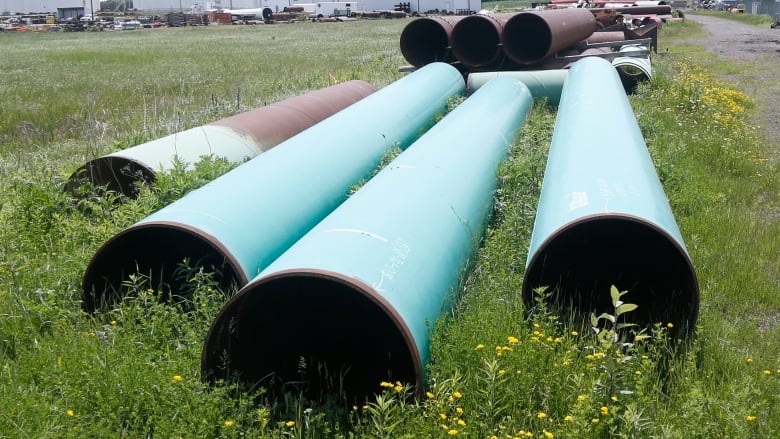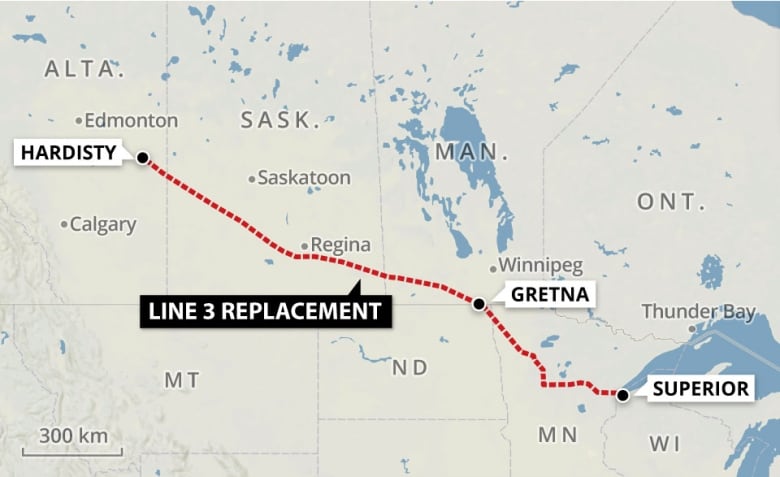Enbridge Line 3 delay 'throws turmoil' into marketplace: expert
Calgary-based company waiting for U.S. state permits to be approved

A one-year delay on a pipeline touted as a sure thing means Alberta's struggling oil and gas sector will need more trains to get product to market and continued production cuts, one economist says.
On Friday,Enbridge announced itsLine 3 pipeline replacement project is being pushed back a year. The long-awaited upgrade to aging infrastructure would haverestoredits capacity from 370,000 barrels per day to its original 760,000 barrels per day.
The project, which was initially expected to be in service before the end of 2019, now won't be ready until the second half of 2020.
"In light of the [Line 3] delay, it is more important than ever for Canadian oil differentials to begin sending the correct price signal meaning a wider spread that supports rail economics to would-be investors in fresh oil-by-rail capacity given that we're going to need many more oil trains than expected rolling down the track next year," wrote Scotiabankeconomist Rory Johnston in a note onTuesday.
Johnston wrote a combination of more trains and continued production cuts will be needed to "prevent discounts from experiencing a replay of last year's blowout sale on Canadian crude."
He said it's expected that at full, uncurtailed production capacity, the call for oil-by-rail services in western Canada will surpass 500 to 600,000 barrels per day before Line 3 will be in service.

He joked that the pipeline's name, Line 3, is fitting as it's the third export pipeline behindthe Trans Mountain pipeline expansion and Keystone XL to be caught in some form of regulatory limbo.
The Trans Mountain pipeline expansion, which Ottawa bought from Kinder Morgan last year, is once again stalled as it awaits further regulatory review andTransCanada'sKeystone XL has been frustrated by court challenges.
Both would have larger export capacity than Line 3, at 580,000 barrels per day for Trans Mountain and 830,000 barrels per day for Keystone XL.
Setback for already struggling market
The latest setback is piling on an already struggling market, according to RichardMasson, a fellow at the School of Public Policy at the University of Calgary and the former head of the Alberta Petroleum Marketing Commission.
"It really throws turmoil into the marketplace when things that should be happening, starting up a pipeline a few months from now suddenly gets thrown into limbo," said Masson.
"Right now, it's very tough for people to invest in new production or even, you know, maintaining production when the prices that we get are discounted, and we can't be sure that we're going to be able to get our production to market."
The setback was reflected in Enbridge's stock price Monday, something Masson said wasn't surprising.
"Now they're not going to earn a return on it for an extra year. So, that's quite negative for investors and that gets reflected in the stock price."
Permits from the state of Minnesota were expected to be finalized by the second quarter of 2019, but now theywon't be provided until November, with U.S. federal permits expected to be finalized one to two months later.
Just two weeks ago, Enbridge hadsaid it was confident the $9-billion project would be in service this year.
The pipeline would export crude from Hardisty, Alta., to Superior, Wis., where it would connect with pipelines to the U.S. Gulf Coast.
Construction began on the Canadian portion of Line 3's replacement in 2017 and the project is largely completed but it has faced challenges in Minnesota, where the state's governor has pursued an appeal, siding withenvironmental and Indigenous groups opposed to the pipeline.
Environmental groups fighting the project have said it will aggravate climate change,and they worry leaks could happen over the Mississippi River headwaters regionland that isused for the traditional harvest of wild rice.
With files from Helen Pike












_(720p).jpg)


 OFFICIAL HD MUSIC VIDEO.jpg)
.jpg)



























































































